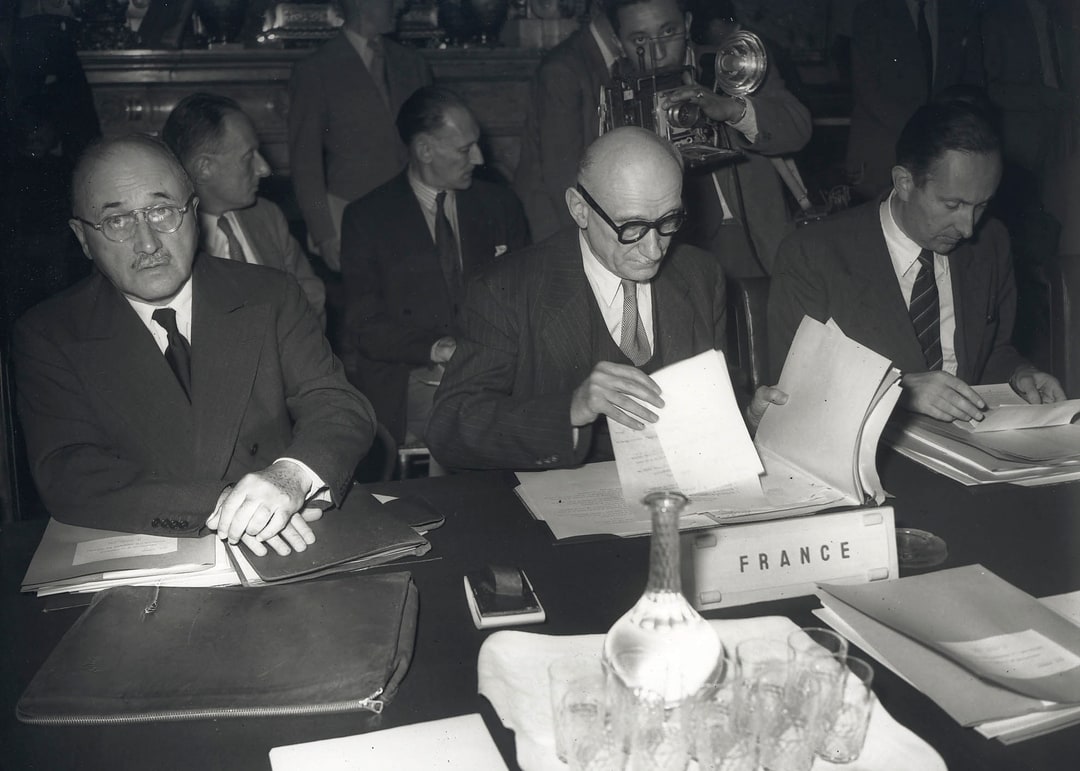ECSC treaty
The ECSC preamble stresses the importance of securing peace through economic integration, following the catastrophic impact of WW2.
The ECSC preamble stresses the importance of securing peace through economic integration, following the catastrophic impact of WW2.
Following the enormous human and material losses of WW2, the European nations (and the US) decided to embrace a new course of social democracy and establish their socio-political order in Europe[6]. Among the various principles of the new system, European cooperation was a core one. The establishment of European cooperative organisations, such as ECO in 1945, OEEC and the Recovery Plan in 1947, the WEU in 1948 and the Council of Europe in 1949, thus, mirrored their desire to prevent from future discord[7]. These organisations, nevertheless, presented intrinsic limitations. Their cooperative, and not integrative, nature, in fact, deprived them of executive power, which remained subject to national interest[7]. Hence the idea that integration, and not simple cooperation, was necessary to avoid future divisions started being popularised by European thinkers[7].

Churchill with Roosevelt and Stalin at the 1945 Yalta Agreement talks [1]

Signing of the Schuman Declaration [2]
In response to the limitations of earlier attempts at cooperation, on 9th May 1950 French Foreign Minister Robert Schuman proposed a revolutionary idea. He argued that the next, necessary step to produce a European system of de factosolidarity was to create a pool of the French and German coal and steel market under a supranational authority, making future war "not unthinkable but materially impossible"[5]. Therefore, on 18th April 1951, a treaty establishing the European Coal and Steel Community (ECSC) was signed by France, Italy, West Germany, and the Benelux countries (Belgium, Luxembourg, and Netherlands).
The treaty introduced two main policies. First, it removed all barriers from the coal and steel trade among member states[8]. Second, it monitored these markets through the establishment of a supra-national entity: the High Authority[8].
The ECSC preamble stresses the importance of securing peace through economic integration, following the catastrophic impact of WW2. Based on the "threat of Europe's future becoming like Europe's past”[8], thus, the preamble aims "to create, by establishing an economic community, the basis for a broader and deeper community among peoples long divided by bloody conflicts; and to lay the foundations for institutions which will give direction to a destiny henceforward shared"[8].
As a main goal, the preamble thus highlights the importance of securing peace in (and beyond) Western Europe. Indeed, because both World Wars had broken out in Europe, the claim is that "the contribution an organised and vital Europe can make to civilisation"[9] is a necessary one to the maintenance of peaceful global relations.
Economic cooperation, in turn, is presented as a key instrument to reach this goal. The preamble implicitly refers to Schuman's project to make war between France and Germany "not merely unthinkable, but materially impossible"[5], by claiming that "Europe can be built only through [...] the establishment of common bases for economic development"[9]. In addition, somewhat less centrally, the preamble also hints at the importance of economic development to the improvement of people's lives and working standards.

The ECSC preamble [3]